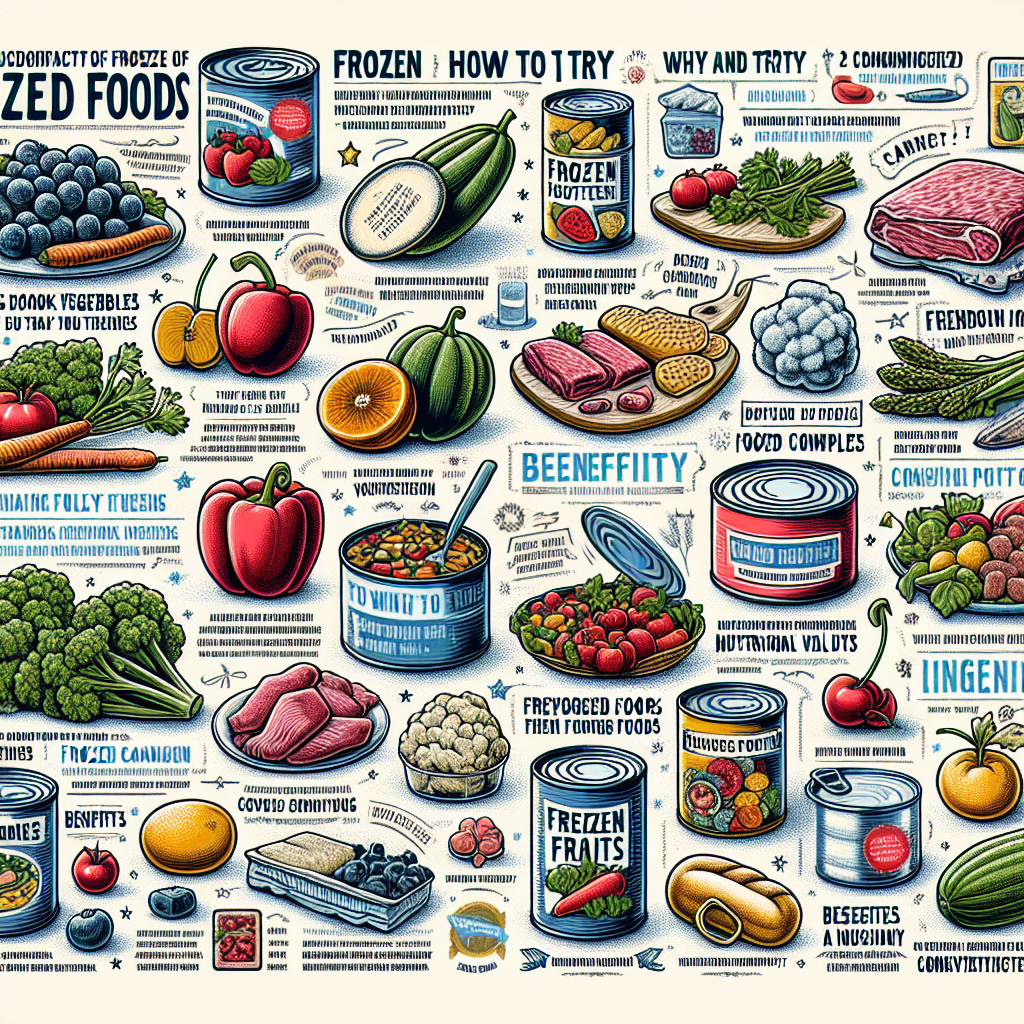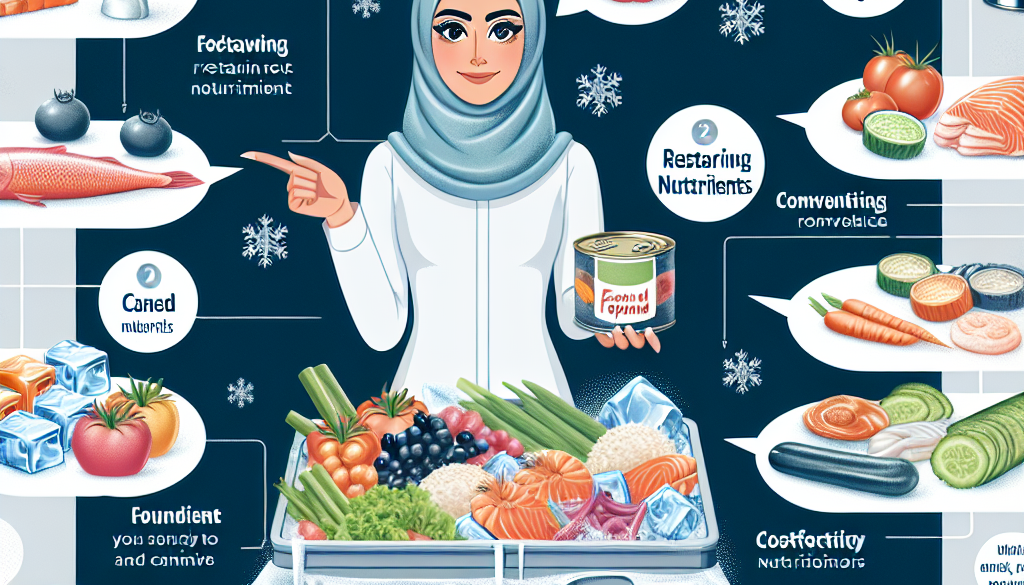Quality of Frozen and Canned Foods; Reasons You Should Try Them
-
Table of Contents
- Exploring the Benefits of Frozen and Canned Foods: A Guide to Quality and Convenience
- Understanding the Nutritional Value of Frozen Foods
- The Advantages of Canned Foods
- Myths vs. Facts: Debunking Common Misconceptions
- Choosing High-Quality Frozen and Canned Foods
- Incorporating Frozen and Canned Foods into a Healthy Diet
- Conclusion: Embracing the Convenience and Nutrition of Frozen and Canned Foods
- Discover ETprotein’s High-Quality Protein Products
Exploring the Benefits of Frozen and Canned Foods: A Guide to Quality and Convenience

In today’s fast-paced world, convenience often dictates our food choices. Amidst the hustle and bustle, frozen and canned foods have become staples in many households. However, there’s a common misconception that these foods are less nutritious than their fresh counterparts. This article aims to dispel such myths by exploring the quality, benefits, and reasons why frozen and canned foods deserve a place in your diet.
Understanding the Nutritional Value of Frozen Foods
Frozen foods have come a long way since their inception. With advances in freezing technology, the nutritional profile of frozen produce is often on par with, and sometimes even superior to, fresh produce. Here’s why:
- Peak Ripeness: Fruits and vegetables are typically frozen at their peak ripeness, a time when they are most nutrient-dense.
- Locking in Nutrients: The quick-freeze process locks in vitamins and minerals, reducing the nutrient loss that can occur in fresh produce over time.
- Reduced Food Waste: Freezing allows for longer storage, meaning less food is wasted due to spoilage.
According to a study by the University of Georgia, in partnership with the Frozen Food Foundation, frozen fruits and vegetables can have equal or higher levels of vitamins and antioxidants compared to fresh. The research found that the vitamin content of frozen peas, green beans, spinach, and even blueberries was greater than that of their fresh-stored counterparts after five days.
The Advantages of Canned Foods
Canned foods are often viewed as a less healthy alternative to fresh or frozen options. However, they have several benefits that make them a viable choice for many consumers:
- Long Shelf Life: Canned goods can last for years, making them a staple for emergency food supplies or pantry stocking.
- Convenience: They are ready to eat or require minimal preparation, saving time and effort in meal preparation.
- Affordability: Canned foods are often more affordable than fresh produce, especially when considering out-of-season fruits and vegetables.
Moreover, canning preserves most of the nutrients in food, with the exception of water-soluble vitamins like vitamin C and B vitamins. However, because canned foods are cooked as part of the canning process, they may be easier to digest and their nutrients more readily absorbed by the body.
Myths vs. Facts: Debunking Common Misconceptions
Let’s address some common myths about frozen and canned foods:
- Myth: Frozen and canned foods are loaded with preservatives.
- Fact: Freezing and canning are natural preservatives. Most frozen fruits and vegetables are free from added preservatives, and many canned foods are available with no added salt or sugar.
- Myth: Canned foods are not as healthy as fresh foods.
- Fact: Canned foods can be just as nutritious as fresh, especially when fresh produce is out of season or has traveled long distances, which can lead to nutrient degradation.
Choosing High-Quality Frozen and Canned Foods
Not all frozen and canned foods are created equal. Here are some tips for selecting the best quality products:
- Opt for frozen fruits and vegetables without added sauces, sugars, or seasonings to control your intake of these additives.
- Choose canned foods with a short ingredient list, and be mindful of added sodium or sugar.
- Look for labels such as “no added salt” or “in its own juice” for canned fruits and vegetables.
- Consider the packaging; for example, cans with a BPA-free lining are preferable.
Incorporating Frozen and Canned Foods into a Healthy Diet
Frozen and canned foods can be part of a balanced diet. Here are some ideas for incorporating them into your meals:
- Add frozen vegetables to soups, stews, or stir-fries for a quick and easy nutrient boost.
- Use canned beans or lentils as a protein source in salads, tacos, or pasta dishes.
- Blend frozen fruits into smoothies or top your cereal with canned fruit for a sweet treat.
- Make a quick salsa with canned tomatoes, onions, and cilantro for a flavorful dip or taco topping.
Conclusion: Embracing the Convenience and Nutrition of Frozen and Canned Foods
In conclusion, frozen and canned foods offer a convenient, affordable, and nutritious alternative to fresh produce. By understanding how to select high-quality products and incorporating them into a balanced diet, you can enjoy the benefits of these foods without compromising on health. Whether you’re a busy professional, a student, or simply looking to streamline your meal prep, frozen and canned foods are practical options worth considering.
Discover ETprotein’s High-Quality Protein Products
If you’re looking to enhance your diet with additional protein sources, consider ETprotein’s range of organic bulk vegan proteins. Their products, including rice protein, pea protein, and various seed proteins, are non-GMO, allergen-free, and boast a neutral taste. ETprotein’s L-(+)-Ergothioneine (EGT) offerings are available in various grades suitable for the nutraceutical, pharmaceutical, and food and beverage industries. For those seeking high-quality protein solutions, ETprotein is a brand that stands out for its commitment to excellence.
About ETprotein:
ETprotein, a reputable protein and L-(+)-Ergothioneine (EGT) Chinese factory manufacturer and supplier, is renowned for producing, stocking, exporting, and delivering the highest quality organic bulk vegan proteins and L-(+)-Ergothioneine. They include Organic rice protein, clear rice protein, pea protein, clear pea protein, watermelon seed protein, pumpkin seed protein, sunflower seed protein, mung bean protein, peanut protein, and L-(+)-Ergothioneine EGT Pharmaceutical grade, L-(+)-Ergothioneine EGT food grade, L-(+)-Ergothioneine EGT cosmetic grade, L-(+)-Ergothioneine EGT reference grade and L-(+)-Ergothioneine EGT standard. Their offerings, characterized by a neutral taste, non-GMO, allergen-free attributes, with L-(+)-Ergothioneine purity over 98%, 99%, cater to a diverse range of industries. They serve nutraceutical, pharmaceutical, cosmeceutical, veterinary, as well as food and beverage finished product distributors, traders, and manufacturers across Europe, USA, Canada, Australia, Thailand, Japan, Korea, Brazil, and Chile, among others.
ETprotein specialization includes exporting and delivering tailor-made protein powder and finished nutritional supplements. Their extensive product range covers sectors like Food and Beverage, Sports Nutrition, Weight Management, Dietary Supplements, Health and Wellness Products, and Infant Formula, ensuring comprehensive solutions to meet all your protein needs.
As a trusted company by leading global food and beverage brands and Fortune 500 companies, ETprotein reinforces China’s reputation in the global arena. For more information or to sample their products, please contact them and email sales(at)ETprotein.com today.












